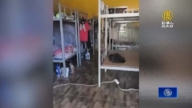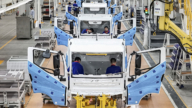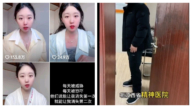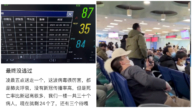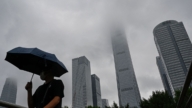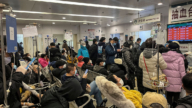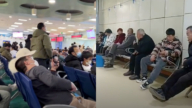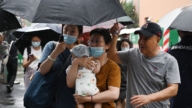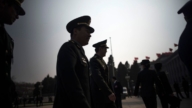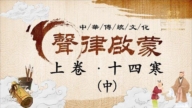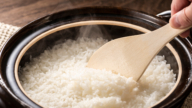【新唐人2011年9月26日訊】大陸媒體近期報導,「四大國有商業銀行」九月份頭半個月和8月底相比,少了4200億元存款。有專家指出,這筆錢可能流入了民間借貸市場。而有跡象顯示,民間高利借貸市場已經是「房地產泡沫後的泡沫」,一旦爆破,後果不堪設想。
大陸媒體9月22號報導,中國「工行」、「農行」、「中行」和「建行」四大國有商業銀行,9月份頭半個月存款數額與8月底存款比較,減少了4200億元人民幣。有學者認爲,中國居民存款餘額是33萬億,4200億元存款只是這個總額的1.5%左右,數目不是很大。
但,美國「南卡羅萊納大學艾肯商學院」教授謝田博士指出,這4200億可能注入了民間借貸市場。這種「高利貸」如果吸引國有銀行捲入,則無法計算資金總數。
謝田:「我覺得有可能進入了民間借貸市場,現在這個民間借貸市場非常瘋狂。利息達到現在月息三分到六分到一毛五。一毛五就不得了了,你想那個月息啊,年利率就得180%,就是高利貸了,超高利貸了。你想180%,借100塊錢,要還280多塊錢。」
9月22號,《新唐人》報導的《浙江信泰集團董事長欠高利貸落跑》新聞,指出,浙江眼鏡行業的龍頭「信泰集團」董事長胡福林欠債潛逃美國,據內部高管透露,胡福林欠款高達20多億,其中銀行貸款8億、民間高利貸12億,每個月,光利息近3千萬元。
而從年初到9月,中國溫州有超過20家企業倒閉,老闆因拖欠高利貸「跑路」,而且,這股風潮正波及杭州、寧波、臺州、衢州等地。
據報導,「人民銀行溫州中心支行」去年底的一次民間借貸問卷調查顯示,有89% 的家庭個人和59.67% 的企業參與了民間借貸。
《和訊網》博客作者童大煥的文章《誰攪動了民間高利貸渾水》寫道,《中國經營報》記者在調查中發現,不管是從銀行流出的資金,還是民間自有的資本,藉助小額信貸或擔保公司,以高利貸方式流出時,進入到實業領域的並不是很多,所謂的「高利貸危局」,只是銀行、國有企業等高利貸鏈條上的資金擁有者,炒作的另一個專案而已。
《南方週末》評論員李鐵,在博文:《中國高利貸的唯一受益者是誰? 》說,民間高利借貸,中小企業當然是受害者,消費者也在分攤著高昂的經濟運行成本;而高風險所帶來的不穩定性,也時刻威脅著借貸者的生存。 「當地政府部門、司法部門、銀行的公職人員也涉及其中。這或許是金融壟斷下的必然結果,在整個高利貸的鏈條中,這些金融權貴,或許是唯一真正得利的一環。」
謝田教授指出,「高利貸」對借貸的中小企業來說不僅是一杯毒酒,一旦金融泡沫崩潰,將帶來社會動盪。
謝田:「但要是捲進的錢的越多的話,泡沫滾得越大,這就非常非常危險。這會把中國金融給摧毀掉。越滾越大的時候,後面的錢跟不上,不能歸還前面借的錢的話,(整個體系)一下子就會垮掉。出現債務危機,很多人跳樓自殺的。這個問題會馬上涉及股市和房市的,都是要命的事情,知道真相的人都會害怕。」
謝田教授表示,中國的金融泡沫破滅,只是時間的問題,一旦爆破,政府也控制不了。
新唐人記者趙心知、吳惟、王明宇綜合報導。
China』s Dangerous Usury-Loan Bubble
Anchor:
Recently, mainland China media reported that four major
state-owned commercial banks had 420 billion Yuan
(US$650.7 million) less on deposit in its first two weeks of
September than they did at in the end of August.
Expert pointed out that the money might have gone into
the private lending market.
There are signs that suggest that these monies were headed
for the civilian usury lending market.
Meaning, these funds were lent out at exorbitant interest rates
and may become the next bubble to pop after the real estate bubble.
The consequences of such an event could be catastrophic.
On September 22, mainland media reported that China’s four
state-owned commercial banks, Industrial and Commercial
Bank of China Limited, Agricultural Bank of China, Bank of China,
and China Construction Bank, had 420 billion Yuan
(US$650.7 million) less on deposit in its first two weeks of
September than they did at in the end of August.
Some expert believed that this 420 billion Yuan
(US$650.7 million) figure is only about 1.5 percent of
the total Chinese savings of 33 trillion Yuan (US$5.16 trillion),
and thus a relatively insignificant number.
However, Carolina Aiken, assistant professor of marketing
at the University of South indicated that this 420 billion Yuan
(US$650.7 million) may have been poured into
the private lending market.
If state-owned banks are also involved in usury,
the total money involved can not unfathomable.
Tian Xie: “I think the money in question has gone into
the private lending market, which is now totally out of control.
Monthly interest rates range from 3 percent, to 6 percent,
and all the way up to 15 percent, which is unbearably high!
Think about it, with a monthly interest of 15 percent,
the annual interest rate would be 180 percent, meaning,
for every $100 loaned, $280 would need to be paid back.
This is usury, and even super-usury!”
On September 22, NTD TV』s report, Chairman of Center
Optical Group On the Run, revealed that the chairman of
the Zhejian Province eyeglass industry, Hu Fulin,
has fled to the United States.
According to a report by an executive member of the Center
Optical Group, Hu Fulin is 2 billion Yuan (US$313 million)
in arrears on his loans, including a 800 million Yuan
(US$125 million) bank loan, and a 1.2 billion Yuan (US$187.8 million) private usury loan.
His interest payments run close to 30 million Yuan
(US$4.69 million), per month.
From January through September, more than 20 companies
closed down in Wenzhou City, China, due to owners defaulting on their usury loans and skipping town.
This trend is spreading to other cities as well, such as:
Hangzhou, Ningbo, Taizhou, and Quzhou, etc.
According to the report, A Survey on Private Lending,
conducted by the Central Branch of People’s Bank of Wenzhou,
89 percent of individuals and 59.67 percent of the companies
surveyed are involved, in some way, with private lending.
As indicated in author Tong Dahuan』s article, Who Stirred
the Civil Usury Muddy Water, a China Business reporter found
that whether it is bank funds, or private owned capital,
to grant small credit loans or to serve as a loan guarantee,
when it involves usury, very little of it goes back into the industry.
The so-called 『usury-critical situation』 is just another case
of banks and state-owned enterprises being at the top of
the usury-loan chain.
Southern Weekend commentator, Li Tie, wrote in a blog titled,
Who』s the Only Beneficiaries of the Chinese Usury?
that small and medium enterprises are the real victims of
the private usury industry, with consumers also being forced
to share in the enterprises』 resulting high operating costs.
The instability caused by the high risk is also threatening
the survival of the borrowers.
“Local government officials, the judiciary branch, and bank
officials, are also involved in the mix, as an inevitable result of monopolized finance.
The financial elite are perhaps the only real beneficiaries
in the usury chain.”
Professor Tian Xie indicated that usury is worse than a glass of
poisoned wine to small and medium lending enterprises.
Once the financial bubble collapses,
it will surely lead to social unrest.
Tian Xie: “The more money that』s at stake, the bigger
the bubble will get; making for a very volatile situation, which could eventually destroy China』s financial markets.
As the bubble gets bigger—snowballing out of control—
the money on reserve will not be able to keep up.
Thus, the borrowed money will not be able to be paid back,
resulting in a sudden collapse of the whole system.
In such a financial crisis,
many people will surely commit suicide.
This will immediately destroy the stock market and
real estate market; and people who know the reality will be terrified."
Professor Tian Xie said that it』s only a matter of time before
China’s financial bubble bursts. And when it does, even the government won』t be able to stop it.
NTD reporters Zhao Xingru, Wu Wei and Wang Mingyu


